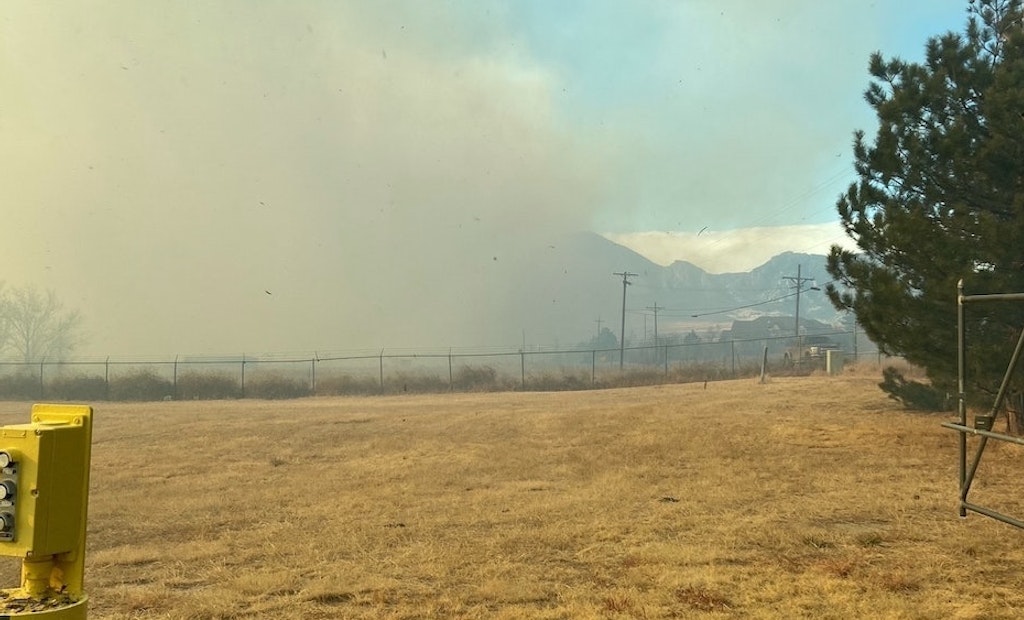Interested in Water?
Get Water articles, news and videos right in your inbox! Sign up now.
Water + Get AlertsThe Marshall Fire of December 2021 was the most destructive in the history of Colorado. The calamity might have been worse if not for the bravery of team members at the two water treatment plants in Louisville.
As it was, the wind-driven wildfire destroyed 1,084 homes in Louisville (pronounced Lewis-ville), neighboring Superior and unincorporated Boulder County. Seven commercial buildings were also destroyed and 30 damaged.
The fire started on the morning of Dec. 30 and burned 6,080 acres. The suspected cause was a coal seam fire in the area that had been smoldering for decades. In the middle of the fight were Greg Venette, water treatment superintendent in Louisville, and his team of operators. They worked around the clock, some risking serious injury or worse, to keep water for drinking and fire suppression flowing to the two cities.
Wind and drought
Louisville (population 21,000) and Superior (13,300) lie about ten minutes west of Boulder in a scenic area against the Rocky Mountain foothills. The city has two conventional water plants: the North Plant (8 mgd capacity) and the South Plant (5 mgd) in summer peak times.
Colorado had been through a long drought. The day of the fire saw winds peaking at 115 mph. Two operators doing maintenance at the South Plant saw smoke from a grass fire and called 911. About 10 minutes later they had to leave because the fire had already grown out of control.
“The fire was moving so fast that it passed through our South Plant site in a little over a minute and then started into some of the homes in Superior before moving into Louisville,” Venette recalls. Soon the city was in chaos and an order went out to evacuate city facilities. The treatment plant staff stayed on because the water supply was critical for firefighting.
Incredible courage
During the day, Venette and operator Jeff Owens had to drive through the fire zone to open an interconnect so that Louisville could provide water to Superior, where the water plant was without power. “We circled through neighborhoods and saw large numbers of houses in flames,” Venette says. “We drove on medians, sidewalks and ditches to get around the traffic. Eventually we arranged a police escort.”
Later they made another hazardous cross-town trip to assess the water level on a 25-foot-tall tank on top of a mesa. In an incredible act of bravery, Owens climbed up on the tank and belly-crawled across the top to open the hatch and look inside.
Meanwhile the team kept the North Plant churning out water at full capacity. By about 11 p.m. the South Plant was online thanks to an emergency generator. At the same time, broken water services at burned-out homes were flowing wide-open; operations crew members entered the fire zone to shut off curb stops and mains and reduce the water losses.
Returning to normal
Once the fire was suppressed, the city team worked with the state Department of Health on a plan to remove the boil order that had been imposed. Both plants were run at a higher chlorine residual, and distribution crews flushed the entire system. Summing up the experience, Venette observes, “Our operators were extremely brave. They were willing to put themselves in danger to protect the community. They really went above and beyond!”
The Louisville team in addition to Venette includes Kurt Kowar, director of public works; Cory Peterson, deputy director of public works; water treatment operators Jeff Owens, Glen Siedenburg, Thoa Pham, Matt Fromandi, Steven Daniels, Vinnie Wray, Chris DePalma and Trevor Depew; and operations technicians Shane Mahan, Ben Francisco and Tom Czajka.






